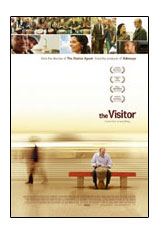Movies |
The Visitor
directed by Thomas McCarthy

By
Published: Jan 01, 2008
Category:
Drama
The Visitor
directed by Thomas McCarthy
Did you ever feel that you were a pretender: going through the motions, sleepwalking through your days, a visitor in — and a stranger to — your own life?
"The Visitor" is filmmaker, writer, and actor Thomas McCarthy’s supremely moving and superbly constructed follow-up to his enchanting directorial debut, “The Station Agent”. Here the veteran character actor Richard Jenkins (“Six Feet Under”) plays Walter Vale, a unfailingly polite and aloof economics professor at Connecticut College. He’s completely alienated from his tedious life. He feels no passion for teaching or writing, recycles old syllabi, connects with no one — a glass of red wine is his only companion. He half-heartedly attempts to raise his faltering spirit by trying to learn to play classical piano, the instrument of his late concert pianist and music teacher wife. He lacks aptitude, but even more he lacks passion.
When his college sends him to Manhattan to read a colleague’s paper at a weeklong economics conference, Walter’s orderly, melancholic life is shaken and transformed. The agents are two illegal immigrants — the Syrian Tarek (Haaz Sleiman) and his Senegalese girlfriend Zainab (Danai Gurira) — who are squatting in his seldom-used New York City apartment. After a nearly violent encounter, Tarek and Zainab apologize to Walter, quickly pack and leave. Walter notices — and seems touched by — a picture of the young lovers on the mantle; perhaps they remind him of the intimacy he had and lost. He catches up with them on the street, returns the picture, and invites them to stay with him for the night.
Zainab, who makes and sells jewelry at flea markets, warms slowly to Walter. Touched by Walter’s generosity — and perhaps mindful of his isolation and wistful vulnerability — Tarek, a talented musician, insists on giving the awkward, aging academic an impromptu lesson on the African drum. An unlikely and inspiring friendship develops, as love for the music brings the two men from wildly different worlds together. The passionate and syncopated rhythms of drumming give Walter’s faltering spirit both an outlet and an unexpected boost.
Then Tarek is wrongfully arrested, and, to help his friend, Walter must draw on a passion he — and perhaps we — didn’t know he had. And with that, "The Visitor" moves into the disturbing realities of overtly political topics: the plight of immigrants and xenophobia. But as it dramatizes the gap between cherished American ideals of liberty and justice for all and grim post-9/11 realities, it never loses sight of the power of friendship to eradicate seemingly intractable barriers of religion, race, and ethnicity — and to transform one’s life.
Psychoanalysts think of character as a stable organization with a slow rate of change. Part of the unsuspected power of "The Visitor" is not only that it brings us in contact with a life-affirming intimacy I suspect we rarely see on screen, but it does something I’ve rarely seen done well in film. (Don Cheadle’s hotel manager in Hotel Rwanda is the exception suggesting the rule.) That is, it shows the personal evolution of a character. The friendship between Tarek and Walter — and the love of music that they share — is the midwife for the convincing transformation of Walter’s character from the living dead to the passionately alive.
Without wasting a motion or a word, Richard Jenkins gives a superb and award-winning performance of great soul and subtlety. But them, everything is at that level; the film is beautifully written, deftly directed and brilliantly acted. This poignant, nuanced and deeply compelling film will resonate with you long after you leave the movie theatre.
— Guest Butler Jeffrey Rubin is a psychotherapist who practices in New York City and Bedford Hills, New York.
To watch a preview of "The Visitor", click here.
To visit the web site for “The Visitor”, click here.
To see if “The Visitor” is playing near you, click here (look to the lower right of the screen). Or here. Or here. Or here.
To read the New York Times review of “The Visitor”, click here.

